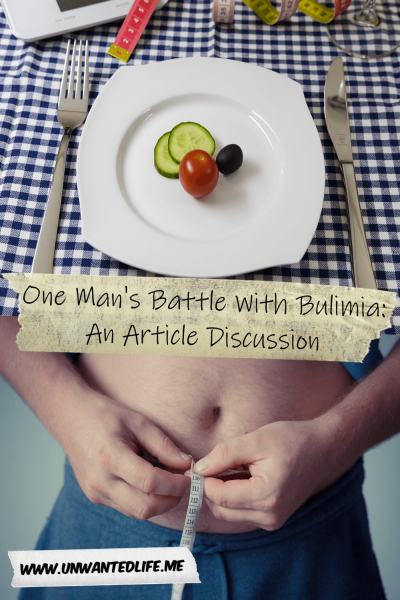I happened upon this article by sheer chance as it appeared in my Facebook newsfeed: Men’s Health and magazines like it aren’t the kinds of publications that I would normally read. However, this particular article struck a chord with me. So I’m glad they decided to run it because it’s a very good article, tackling the long-ignored subject of male eating disorders (in this case bulimia). The article (One Man’s Battle with Bulimia) gives an interesting insight into the frequency of eating disorders in men.
What Is Bulimia?
According to the NHS, people with bulimia can go through cycles of binge eating a lot of food in a short space of time, then making themselves sick, using laxatives, exercising excessively, or a combination of these to stop themselves from gaining weight. However, Beat goes on to add another step sufferers can take to control their weight after bingeing, and that’s to starve (fasting) themselves.
Article: One Man’s Battle with Bulimia
The article offers a case study style insight into what it’s like being a male sufferer of an eating disorder, discussing Magson’s five-year battle with bulimia, laying out how the behaviour of being sick became routine and how his struggle with his identity and sexuality played its part in developing the disorder.
Magson wasn’t able to get support for his bulimia when he tried to seek out support because those who could have helped him held outdated views on eating disorders: men don’t have eating disorders. His courage to reach out for help was swatted away.
Eating disorders are pigeonholed as a female issue. And yet up to 25 per cent of sufferers are male, according to the UK’s leading eating disorders charity, B-EAT.
Because eating disorders like bulimia were, and still are, to a lot of people, considered being a female condition. The guilt, shame, and low self-esteem that come with bulimia can be more intense for men (Gürze – Salucore: Eating Disorders Resource Catalogue). Due to this, it can be harder for men to reach out for help in the first place, let alone get help when they do look for support.
One of the main ways men can develop bulimia can be due to athletic interests, such as bodybuilding and boxing. These kinds of sporting endeavours use bulimia to maintain or lose weight to get into certain weight classes or to reduce body fat to make their muscles look shredded. However, any behaviours you engage in frequently can easily become an established behaviour akin to being addicted to doing it.
This issue with male bodybuilders and bulimia was captured in a study by Goldfield, Blouin, and Woodside (2006). The study participants were recreational and competitive bodybuilders who were asked to complete questionnaires that would investigate eating attitudes and behaviour, weight loss practices, and general psychological characteristics. The questionnaires also sought to investigate the prevalence of past and current use of anabolic-androgenic steroid use and attitudes toward steroid use.
Of the 74 participants in the study performed by Goldfield, Blouin, and Woodside (2006), the results found that 8% of recreational male bodybuilders met the criteria for bulimia at some point in their lifetime, whereas it was 30% for male competitive bodybuilders. Across both groups of male bodybuilders, the study found that men had high rates of weight and shape preoccupation and extreme body modification practices.
Luckily for Magson, he eventually took another chance at getting help for his bulimia, this time reaching out to an eating disorders charity that didn’t dismiss him for simply being male. The support they gave him helped him address his issues and make a lot of positive changes.
This may be one man’s story, but it’s not unique. Many men experience issues with eating disorders, such as bulimia, so we need to normalise conversations about men with eating disorders. Be part of the conversation and go check out the article by clicking here.
The doctor said I was a boy and therefore didn’t have an eating disorder; it was just stress-related
If you’re not in the mood to read any more articles today, then you could try to check out the BBC Three documentary on which the article is based on The Naked Truth.

My Thoughts
The article reminds me of my own issues with food, which has inspired me to want to write about my own eating disorder. Hopefully, in turn, this will further encourage the people reading my blog to do the same, get people to talk about their eating disorders, and if you are suffering from an eating disorder, to reach out for support, whatever your gender identity is.
So keep an eye out for my detailed article about my turbulent relationship with eating: Did Poor Mental Health Cause My Unhealthy Relationship With Food?
As always, leave your feedback in the comments section below. Also, feel free to share your experiences with an eating disorder in the comments section below as well. If you want to stay up-to-date with my blog, then sign up for my newsletter below. Alternatively, get push notifications for new articles by clicking the red bell icon in the bottom right corner.
Lastly, if you’d like to support my blog, then you can make a donation of any size below as well. Until next time, Unwanted Life readers.
Support
Anorexia and Bulimia Care
References
Goldfield, G. S., Blouin, A. G., & Woodside, D. B. (2006). Body Image, Binge Eating, and Bulimia Nervosa in Male Bodybuilders. The Canadian Journal of Psychiatry, 51(3), 160–168. Retrieved from https://doi.org/10.1177/070674370605100306 and https://journals.sagepub.com/doi/pdf/10.1177/070674370605100306.


Another really interesting and thought provoking post from you. I admire you for sharing these kinds of posts but I also know that they will help so many people. Until my older sister went to uni, I never considered bulimia in males. I understand it more and more as I grow older
Rosie
Thank you. It’s a pretty common opinion given that most of our generation were raised on the idea that eating disorders were a female problem
This is very insightful, the male perspective of bulimia and other eating disorders is rarely considered, so thank you for offering this point of view
Thanks for commenting
Often a male perspective on these issues is missing in discussions and support — so glad you shared this.
Indeed
Interesting to learn about “Bulimia”. And the study help to understand more about it. Thank you for sharing!!
Thanks for commenting
A very insightful post. It’s good to hear fro mother male side. I have known women who have suffered. It’s a hard thing to go through and it’s good to raise awareness about this.
Thanks for sharing
Very nice post. It’s actually interesting. It’s just sad to say that our society is sometimes gender bias. Men can also have behavioral problems as much as women have. We shouldn’t judge men when they have it. Let’s be human <3
Biases are a huge problem throughout society and we all need to help tear those biases down